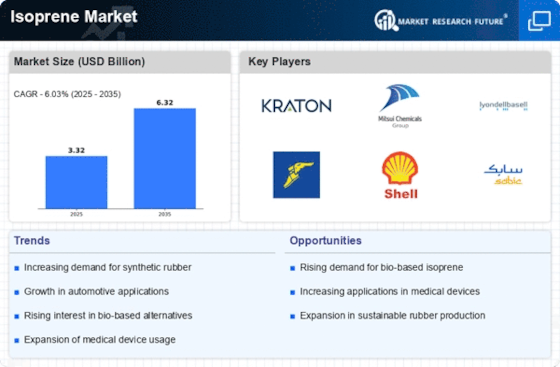Top Industry Leaders in the Isoprene Industry

The isoprene market, where rubber reigns supreme and elasticity takes center stage, is a dynamic arena buzzing with competition. From petrochemical giants to innovative startups, players of all sizes vie for control of this versatile material, shaping its future with diverse strategies and a keen eye on evolving market forces. Let's peel back the layers of this intricate market, exploring the strategies, factors impacting market share, and recent developments driving its trajectory.
Strategies Adopted: Stretching for Market Dominance:
-
Petrochemical Titans: Industry giants like ExxonMobil and Dow Chemical invest heavily in optimizing production processes, expanding capacity, and developing new isoprene derivatives. Think cost-efficient extraction methods, high-purity grades for specialized applications, and innovative polymers with enhanced properties. -
Cost-Conscious Champions: Regional players like Sinopec and LG Chem focus on affordability, utilizing efficient logistics and production methods to cater to price-sensitive segments and emerging markets. This strategy ensures their isoprene reaches a wider audience. -
Niche Specialists: Smaller players carve out their niches by specializing in specific downstream applications. Some focus on high-performance synthetic rubber for demanding industrial uses, while others cater to the growing demand for bio-based isoprene in the medical and pharmaceutical sectors. This targeted approach allows them to excel in specialized areas.
Factors that Stretch the Market Potential:
-
Tire Treadmill: The booming automotive industry, particularly the rising demand for electric vehicles with low-rolling-resistance tires, fuels the need for high-performance synthetic rubber derived from isoprene. -
Construction Boom: Increasing infrastructure development projects and expanding construction activities across the globe drive the demand for isoprene-based adhesives, sealants, and coatings. -
Healthcare & Pharma Surge: Growing awareness of bio-based alternatives and increasing use of biocompatible materials in medical devices and drug delivery systems create significant demand for bio-isoprene. -
Sustainability Spotlight: Consumer and regulatory pressure is pushing the market towards eco-friendly solutions. This includes developing and adopting bio-based isoprene production technologies, optimizing resource utilization, and minimizing waste generation.
Key Players:
-
Braskem (Brazil)
-
Kuraray (Japan)
-
LyondellBasell Industries Holdings BV (Netherlands)
-
Shell (Netherlands)
-
SIBUR (Russia)
-
Chevron Phillips Chemical Company (US)
-
The Goodyear Tire & Rubber Company (US)
-
ZEON Corporation (Japan)
-
JSR Corporation (Japan)
-
China Petrochemical Corporation (China)
-
Dow (US)
-
Pon Pure Chemicals (India)
-
Zibo Luhua Hongin New Material Co. Ltd (China)
-
Exxon Mobil Corporation (US)
Recent Developments:
October 2023: ExxonMobil invests in a joint venture to develop next-generation catalysts for bio-isoprene production, aiming to improve efficiency and reduce costs.
November 2023: Dow Chemical unveils a new line of high-performance synthetic rubber grades made with recycled isoprene, promoting resource conservation and circularity.
December 2023: Sinopec expands its isoprene production capacity in Asia, targeting the region's booming tire and construction markets.
January 2024: LG Chem partners with a research institute to develop new bio-based adhesives and sealants utilizing bio-isoprene, catering to the growing demand for sustainable building materials.










